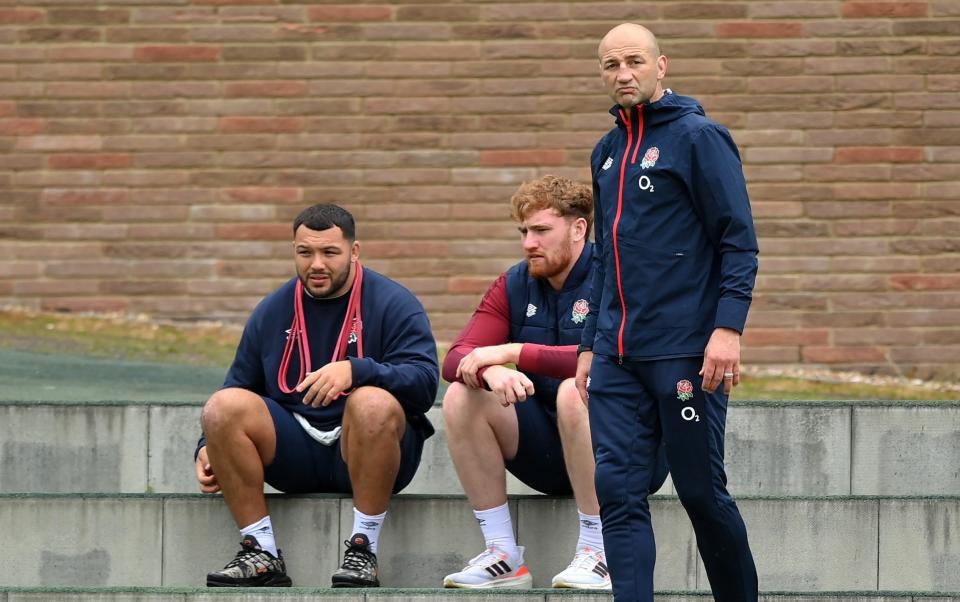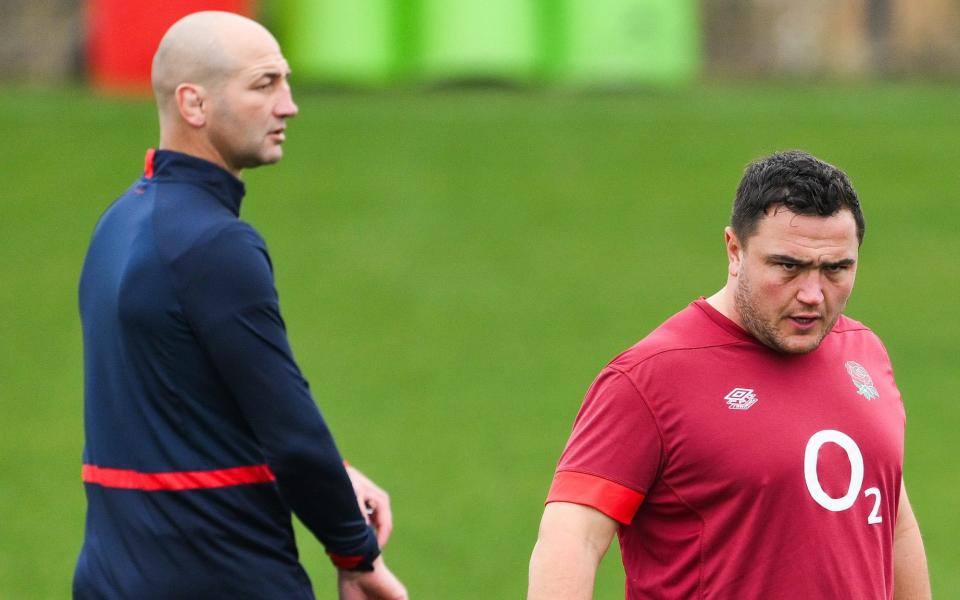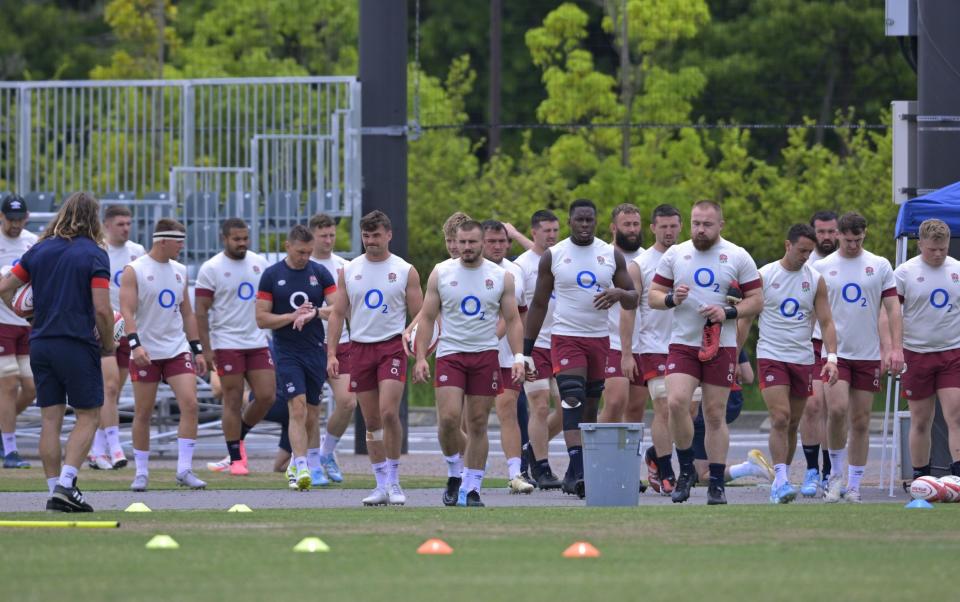How sharp words from Jonny May got England pulling in the same direction

In a coffee shop in Verona, a small group of England’s senior players gathered around a table, each wondering what they were doing there. The invitation had come from England head coach Steve Borthwick. Was this a social thing? Surely not.
Their bafflement was not misplaced. They knew that Borthwick rarely does anything without a purpose. The gathering in the northern Italian city, famous as the setting of Romeo and Juliet, would have dramatic repercussions.
Borthwick arrived with Richard Wigglesworth, his attack coach. It was July 2023 and England were already in their second month of training for the World Cup in France. Verona had been chosen to allow the players to train in extreme heat, both for physical adaptation but also to test how they would react while experiencing physical and emotional stress.
The stress levels were starting to rise in the coffee shop, too. Borthwick told the players that he should not be there. The only reason that he had been parachuted in as England coach just nine months before the start of the World Cup following the sacking of Eddie Jones was that the team had lost too many games. And too many games that they should have won.
And what mystified Borthwick was that why, no matter what the players had made of the coaching under Jones, they had not attempted to arrest the slide themselves? He turned to Jamie George, Dan Cole, Ellis Genge and Joe Marler. England’s scrum had fallen to 10th in the world rankings. How had it come to this? Borthwick promised them that he would give everything to coach them to the best of his ability, but to do so he needed total buy-in from them.
Borthwick asked the players to start holding meetings themselves so they could take greater ownership. He would attend but only if they wanted him too. It took another prompt a couple of weeks later before the meetings would get under way, and when they did, several other senior players were added.
The ‘England Way’
The most impactful contribution came from Jonny May, who is known for his bluntness. May is said to have challenged Owen Farrell, Courtney Lawes and Ellis Genge, asking how they expected the squad to all be on the same page when they were at odds with each other. The words landed. Everyone started pulling in the same direction.
The players did not know it yet, but they had just taken the first step of what has become known as the “England Way”, a coaching framework that underscores Borthwick’s vision for his side.
There was not enough time before the World Cup in France, however, to make many significant changes. Borthwick contacted Tony Bennett, the head coach of the University of Virginia basketball side after listening numerous times to his podcast on “Winning and What Truly Matters”. Bennett told him that before a side started winning, they had to stop losing. England had too often been architects of their own downfall. If you do not stand for something, you fall for anything, Bennett warned.
At the core of England’s new identity, Borthwick wanted them to become renowned for being hard to beat, an attribute instinctive to the best English sides.
The decision was taken to stick with experience and a limited game plan at the World Cup, even if it would result in brickbats from all corners about their playing style, to achieve the first major transition, one that would culminate in an above-par third-place finish.
The evolution accelerated during the Six Nations this year, with the next milestone coming after the defeat by Scotland at Murrayfield. One of the most damaging legacies of Jones’s tenure was the impact of bearing the weight of the fear of failure.
🏉 @sageuk Play of the Round!
🏴 Scotland regain the ball from a Jamie George lineout 10m inside the England half
➡️ Ball is passed to Finn Russell who goes to chip but has his effort charged down by Ollie Lawrence
💪 Redpath regains and breaks towards the England 22… pic.twitter.com/PBtGtahg3Q— Guinness Men's Six Nations (@SixNationsRugby) February 25, 2024
Players spoke of the torment of attending post-match reviews led by a sports psychologist employed by Jones who lost all respect by talking about their own achievements while highlighting the players’ shortcomings. The weight of the England shirt became so heavy that, at times, it was easier for players to go missing in games for fear of the consequences of making mistakes.
When the squad arrived for a training camp in York following the defeat at Murrayfield during a fallow week in the Six Nations, they feared the worst.
The defeat by Scotland was the first time since the defeat by Fiji at Twickenham in the final World Cup warm-up match that England’s key men had “played soft”. The defeat by Fiji could be explained by the fear of picking up an injury the week before heading to France for the World Cup, heightened by a tearful withdrawal by Anthony Watson just days earlier after he had picked up a calf injury in the defeat by Ireland.
There was no such excuse for the Scotland defeat, which was more critical, coming at a make-or-break moment for England’s Six Nations campaign.
George Furbank had replaced Freddie Steward at full-back in an attempt to bring greater pace and creativity to the back three but had endured a torrid afternoon in Edinburgh. So, too, had George Ford at fly-half. The first thing Borthwick did was approach both of them and reassure them they were already in his team to face Ireland in 10 days’ time.
“We had all been s---ting ourselves,” one player said. “We had been here before too many times and feared the worst. But Steve defused the situation on the first day.”
What had disappointed Borthwick most was not the mistakes, but that players had taken themselves out of the fight as a consequence. Borthwick told them that he would prefer to pick a lesser player who stayed in the fight than a more talented one who opted out.
He did not want players looking over their shoulders. They should know that if they had been picked, he was going to have their backs as long as they were giving everything they had. England were never going to compete with the best in the world unless they had a mindset that wanted to make things happen. One that wanted to avoid mistakes was of no use to anyone.
It was a sentiment not lost on Jamie George, the England captain.
“I know that personally, playing with fear doesn’t bring the best out of me,” George said. “It might work for certain individuals but it doesn’t work for me, so having the trust of the head coach for a lot of people is really valuable. Our ethos as a team is that we want to encourage people to push – we are not going to get better if we just keep doing the same things.
‘We need to be in a position where we are OK with making mistakes. We don’t want to make the same mistake twice, but as long as those mistakes are made with an intention to get the team better or at an intensity where we are trying to push things, then we have no problem with that.”

When the players assembled for the summer tour involving Tests against Japan and two against New Zealand, that message had been expounded again and again to the players as Borthwick sought to implement the next stage of the “England Way”.
Encouraging a “play-without-fear mindset” is not just about the reaction to performances, but taking stress away from the players when they arrive in camp. There are still many players scarred from previous defeats who carry that burden with them.
Analysis shows the correlation between stress and performance for most players remains positive until stress levels dominate. Some do respond better to the stick than the carrot, but this England coaching team have placed a premium on taking stress away from them.
Similar to how Brendon McCullum has forged an environment with the England cricket team, Borthwick wants his players to know their worth in his squad to free them up to perform at their best.
But there is a bigger picture at play, too. Borthwick tasked his analysts to look at the correlation between consistency in selection and success, given the perception that, after the 2019 World Cup and Jones’s departure in 2022, there had been no apparent clear direction in selection and an alarmingly high rate of churn.
A scoring system was used to look at how often a player was picked in the 23-man squad in the last 10 games. In 2021, England averaged a score of nearly eight out of 10, the highest of all their international rivals, but it collapsed the following year, with disastrous consequences.
The top three sides in the world, South Africa, Ireland and New Zealand have scores of 6.39, 6.70 and 6.28 respectively. England are sitting at 5.37. Borthwick’s target for England is 6.50 or above, which explains why he is going to select his strongest sides for all three games on the tour.
The continuity of selection also offers benefits in cohesion and experience, two other key performance indicators for the best teams. While a target of picking a match-day squad with at least 900 caps will be beyond England during this tour, if Borthwick can pick at least the same 20 players for every game, England will increase their total number of caps by 60 over this tour, 80 in the autumn Test series and by 100 during next year’s Six Nations.

That will be key in maintaining the level of experience when veterans such as Dan Cole and Joe Marler end their Test careers.
The desire for greater cohesion will lead England to continue to draw on club combinations – they deliberately picked five Harlequins on the bench against Ireland because of the impact it could have in the final quarter – while Borthwick also hopes stability in selection and mindset will allow the team’s identity to flourish.
England may be forced to wear their dark blue away kit against Japan in the searing heat and humidity brought by an afternoon kick-off, no doubt deliberately picked by Jones to make his former team feel the heat. But no matter the strip, Borthwick hopes his “England Way” will mean his side play in a way that makes them instantly recognisable.

